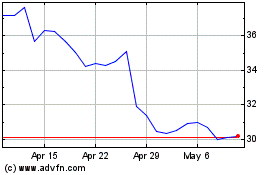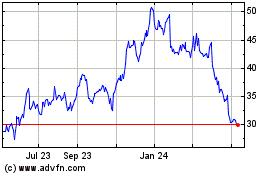Arizona, Site of Deadly Uber Crash, Pushed to Become Nation's Test Lab for Driverless Cars -- Update
March 20 2018 - 11:03PM
Dow Jones News
By Alejandro Lazo
The deadly Uber crash in Arizona, the first known fatality
involving an autonomous vehicle in the U.S., is a setback for a
state that has aggressively sought to become the nation's test lab
for driverless cars.
Arizona Gov. Doug Ducey, a Republican, has made welcoming
technology companies to test their products in Arizona a hallmark
of his administration. He has particularly embraced the driverless
car industry.
Less than a month ago, Gov. Ducey issued an executive order
allowing driverless cars on Arizona streets without a human, if the
vehicles follow all traffic rules. It was an update of the 2015
order that first allowed driverless cars on the road.
The car that struck and killed 49-year-old pedestrian Elaine
Herzberg in Tempe, Ariz., Sunday night was an Uber Technologies
Inc. self-driving car in autonomous mode, with a human safety
operator at the wheel.
"Our prayers are with the victim, and our hearts go out to her
family," said Patrick Ptak, a spokesman for Gov. Ducey. "Our office
is in communication with law enforcement. Public safety is our top
priority."
The accident occurred in a part of the greater Phoenix metro
area that the governor and economic development groups have been
promoting as a hub for the driverless car industry. Gov. Ducey's
recent order said more than 600 driverless vehicles are being
tested on state roads, by such companies as Uber, Alphabet Inc.'s
Waymo, General Motors' Cruise Automation and Intel. Waymo has been
testing vehicles in the Phoenix area without humans behind the
wheel, and it plans to begin commercial robot taxi services there
this year.
The Arizona crash comes as regulations for driverless cars at
the federal level and in many local jurisdictions are under review.
The National Highway and Transportation Safety Administration has
released voluntary federal guidance for automated driving systems
to industry and technical assistance to states. A bill with
policies aimed at driverless car technology has passed the U.S.
House and a similar bill awaits consideration in the U.S.
Senate.
Twenty-one states have enacted legislation aimed at regulating
autonomous vehicles, and seven states have had governors issue
executive orders pertaining to the industry, according to the
National Conference of State Legislatures.
California is set to begin issuing permits for driverless
testing and deployment permits for autonomous vehicles April 2. A
spokeswoman for California's Department of Motor Vehicles said, "We
are aware of the Uber crash in Arizona and are in the process of
getting more information."
Critics have said states such as Arizona are moving to quickly
and not ensuring public safety. Rosemary Shahan, founder of
Consumers for Auto Reliability and Safety, said states such as
Arizona are "abandoning their responsibility to ensure that the AVs
are safe prior to allowing them to be deployed."
Gov. Ducey has said the state is committed to safety in its push
for technology testing. The governor created a committee in March
2016 to advise the state's Transportation Department on policies
related to self-driving cars, and his latest executive order
established penalties for those testing or operating the fully
autonomous vehicle. A human tester may be issued a traffic citation
or another "applicable penalty" if the vehicle fails to comply with
traffic or motor vehicle laws.
Kevin Biesty, deputy director of Arizona's Department of
Transportation, said the state treats driverless vehicles as it
would any other vehicle tested on its roads, and human safety
operators only need driver's licenses to operate.
Mr. Biesty said the state would investigate if necessary, though
it will be up to local prosecutors and the police to determine if
any crime was committed. He said the state has no plans to suspend
or change its driverless vehicle program. "Nobody has been able to
point to something that would enhance the safe we believe our
system offers," he said.
Since taking office in 2015, Gov. Ducey has made a point of
cutting regulations for businesses. Last year, the governor's
office said it cut more than 600 regulations for businesses, and it
plans to do away with another 500 this year. In 2016, he signed a
bill prohibiting local governments from banning short-term rental
companies such as Airbnb.
The state also passed a law allowing Arizonans to order their
own lab tests in his first year in office. The law had been sought
by now-embattled blood-testing company Theranos, which had a major
presence in Scottsdale. The federal government last week filed
civil fraud charges against the company's founder, who was stripped
of voting control of Theranos under a settlement with federal
regulators.
Theranos reimbursed more than 76,000 Arizonans in full,
according to the state attorneys general office. The company closed
its clinical lab in Scottsdale.
Last December, the governor welcomed self-driving Uber cars in
front of the Arizona state capitol in Phoenix, after the company
moved the cars from California following a dust-up with the state's
Department of Motor Vehicles.
"California may not want you, but we do," he said at the
time.
Write to Alejandro Lazo at alejandro.lazo@wsj.com
(END) Dow Jones Newswires
March 20, 2018 22:48 ET (02:48 GMT)
Copyright (c) 2018 Dow Jones & Company, Inc.
Intel (NASDAQ:INTC)
Historical Stock Chart
From Mar 2024 to Apr 2024

Intel (NASDAQ:INTC)
Historical Stock Chart
From Apr 2023 to Apr 2024
